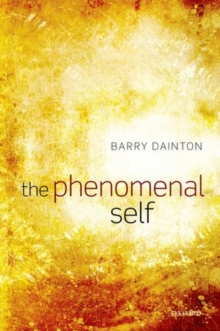Description
| Product ID: | 9780199692248 |
| Product Form: | Paperback / softback |
| Country of Manufacture: | GB |
| Title: | The Phenomenal Self |
| Authors: | Author: Barry Dainton |
| Page Count: | 472 |
| Subjects: | Phenomenology and Existentialism, Phenomenology & Existentialism, Philosophy: metaphysics and ontology, Philosophy: epistemology and theory of knowledge, Philosophy of mind, Psychology: states of consciousness, Philosophy: metaphysics & ontology, Philosophy: epistemology & theory of knowledge, Philosophy of mind, States of consciousness |
| Description: | Select Guide Rating Barry Dainton presents a fascinating new account of the self, grounded in the continuity we find in our streams of consciousness: this is the key to explaining how we can undergo changes but remain the same person. He has original things to say about personal identity, the conditions of our existence and survival, and our relation to our bodies. Barry Dainton presents a fascinating new account of the self, the key to which is experiential or phenomenal continuity.Provided our mental life continues we can easily imagine ourselves surviving the most dramatic physical alterations, or even moving from one body to another. It was this fact that led John Locke to conclude that a credible account of our persistence conditions - an account which reflects how we actually conceive of ourselves - should be framed in terms of mental rather than material continuity. But mental continuity comes in different forms. Most of Locke''s contemporary followers agree that our continued existence is secured by psychological continuity, which they take to be made up of memories, beliefs, intentions, personality traits, and the like. Dainton argues that a better and more believable account can be framed in terms of the sort of continuity we find in our streams of consciousness from moment to moment. Why? Simply because provided this continuity is not lost - provided our streams of consciousness flow on - we can easily imagine ourselves surviving the most dramatic psychological alterations. Phenomenal continuity seems to provide a more reliable guide to our persistence than any form of continuity. The Phenomenal Self is a full-scale defence and elaboration of this premise.The first task is arriving at an adequate understanding of phenomenal unity and continuity. This achieved, Dainton turns to the most pressing problem facing any experience-based approach: losses of consciousness. How can we survive them? He shows how the problem can be solved in a satisfactory manner by construing ourselves as systems of experiential capacities. He then moves on to explore a range of further issues. How simple can a self be? How are we related to our bodies? Is our persistence an all-or-nothing affair? Do our minds consist of parts which could enjoy an independent existence? Is it metaphysically intelligible to construe ourselves as systems of capacities? The book concludes with a novel treatment of fission and fusion. |
| Imprint Name: | Oxford University Press |
| Publisher Name: | Oxford University Press |
| Country of Publication: | GB |
| Publishing Date: | 2011-06-30 |
